ZXR10 ZSR V2 Series Router Product Description
24 ZTE Confidential & Proprietary
CSPF (Constrained Shortest Path First)
Basic functions of RSVP-TE: it implements RSVP-TE basic functions defined by
RFC2205 and RFC3209. It can establish and maintain TE tunnel by Path/Resv
message interaction.
RSVP-TE FRR: it implements link protection and node protection of RSVP-TE
FRR protocol functions in Facility defined by RFC4090 to offer LSR RSVP-TE
local protection capability.
RSVP-TE Graceful Restart: it implements Graceful Restart by RFC3473, Draft
‘Extensions to GMPLS RSVP Graceful Restart’, and recovery mechanism for
restart at adjacent multiple nodes defined in the section of ‘failure recovery’.
RSVP-TE MIB.
RSVP-TE expansion: RSVP-TE MBB, re-optimization, preemptive priority,
abstract update, automatic routing, FA, Hot-standby, and authentication.
3.5 VPN
3.5.1 IPSec VPN
IP Security (IPSec) is an IETF-defined IP-layer security framework protocol. It protects
sensitive data transport in an unprotected network (e.g., the Internet). It defines IP packet
formats and related infrastructure for confidentiality, data integrity, anti-replay and
enhanced identity authentication in network communication IP packet transport.
Confidentiality means encrypting user data and sending it in the form of ciphertext.
Data integrity means ensuring no data modification in the transport. IPSec
authenticates the data received to determine whether the packet has been modified.
Anti-replay means comparing the slide window of the target host with the sequence
number of the received packet to identify whether the packet is copied, preventing a
malicious user from intercepting IPSec packets and reinsert them into the session.
Origin certification means identifying the identity of the data sender through a
pre-shared key or RSA signature.

